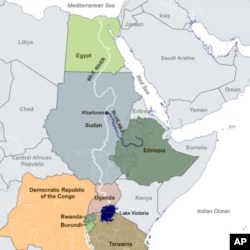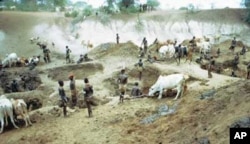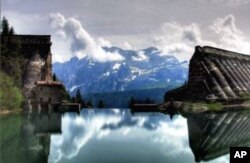This is Part 3 of a 5-part series: Sharing the Nile's Waters
Parts 1 / 2 / 3 / 4 / 5
Water use issues have long been a source of contention among the Nile Basin countries, which disagree over the distribution of the river’s waters.
For decades, the allocation has been determined by an agreement that’s been re-negotiated recently and that could alter the historic water-sharing arrangements for the Nile.
The new accord, the Cooperative Framework Agreement, includes a provision that concerns Egypt. Unlike previous agreements, Article 14b does not recognize the historical right of Egypt to 55 billion cubic meters of Nile Water. Some say the country could lose billions of metric tons of water.
The previous agreements date back to the colonial era and were backed by Great Britain in order to develop Egypt’s agriculture.
They include those of 1902 and 1929, which gave Egypt access to and authority over most of the Nile. A 1959 treaty guaranteed Egypt nearly 56 billion cubic meters of water and Sudan 18.5 billion.
Sharing the water
Many say the question now is what Ethiopia and the rest of the upstream countries can do to assure Egypt that it will not suffer a reduction in water, which it needs in particular for agriculture and human consumption.
The need is to ensure that all Nile countries can share water in an equitable way.
“It is better to frame the question this way instead of locking it in the rhetoric of policy makers who like to refer to specific treaties that do not have validity in post-historic or legal terms,” says Alem Hailu, African studies professor at Howard University in Washington, DC.
Using other resources
Some Egyptian observers say upstream countries, including Ethiopia, have other sources of water, including lakes they can tap for water rather than using the resources of the Nile.
Hailu disagrees.
“It is true,” he says, “that Ethiopia, Uganda, and other Basin countries have other resources, but the Nile Basin region, where the water comes from, has been an area where drought is pervasive and poverty rampant. That is why countries like Ethiopia are demanding their fare share of resources, so their people will be able to survive as well. They are fighting starvation and would like to have food security.”
Cooperation or war
The concern comes, says Hailu, “when policymakers frame the issue in terms of ‘If we don’t get our water we will bomb’ type of mentality.”
Should Ethiopia then be concerned about strains with Egypt over the Nile waters?
Professor Hailu says, “Geographically and regionally the relationship of Egypt and Ethiopia is very important. They are locked in many ways.”
Hailu says recent developments in Egypt show the military and civil leaders in Cairo favor pragmatism and accommodation rather than confrontation.
“In fact, the recent uprising and upheavals in Egypt and elsewhere show political leaders seem to be framing issues in terms of a win-win situation, where everybody benefits,” explains Hailu.
Win-Win
The issue should be framed in a way that benefits all, Hailu says. “Egypt and Ethiopia should find a path for joint development, not playing games of power politics.”
He says the new treaty provides that framework, by allowing upstream development in Ethiopia, which in turn will help develop Egypt and other countries.
“There is a proposal underway for hydro-power (dams) worth 1.4 billion dollars. There are regions in the Lake Tana area that need to be developed.”
Hailu says the best way for Egypt to share the Nile water would be building massive reservoirs in the Ethiopian highlands rather than relying solely on Lake Nasser near the Aswan dam close to the border with Sudan.
The lake, he says, loses nearly a quarter of the Nile Waters that empty into it each year due to evaporation.
“If Ethiopia and the other basin countries succeed in sustaining their environment, it is a great benefit for Egypt as well.”
For Ethiopia, he says that means hastening development in the Ethiopian highlands of Gojjam and the Bahar Dar area bordering Gondar.
More influence for Ethiopia
Observers say hydro-power and other developments could improve Ethiopia’s power and influence in the region. It could also strengthen the Meles Zenawi government, which has come under criticism from domestic observers and Ethiopians in the Diaspora.
Hailu is not so sure. He says this is a national issue rather a Meles-centered one: “Meles will come and go like all other governments.”
“The issue,” he says, “should be accentuating Ethiopia’s role as a historical country that has played a big role in Africa’s liberation.” Today, say observers, it can play a historic role in the continent’s economic revival.


